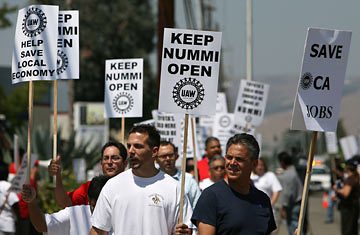
Union workers from New United Motor Manufacturing Inc. carry signs as they protest plans to shut down the Toyota plant in Fremont, Calif.
Toyota has announced plans to close the last auto plant on the West Coast next March, prompting angry objections from the United Auto Workers, community groups and politicians throughout the state of California. The shutdown of the New United Motor Manufacturing Inc. (NUMMI) plant in Fremont, Calif., across the bay from San Francisco, marks the first time the Japanese automaker has deviated from its policy of maintaining employment.
But it wasn't fully a Toyota decision: Toyota's partner in the plant, General Motors, elected to pull out last June, leaving the plant unprofitable, Toyota says. "After the decision by General Motors to withdraw from the NUMMI joint venture, Toyota conducted a thorough review of its alternatives in light of current and anticipated market conditions," says TMC executive vice president Atsushi Niimi. "Based on this review, we have determined that over the mid-to-long term, it just would not be economically viable to continue the production contract with NUMMI."
GM had been under pressure from the government's auto task force to cut brands, and Pontiac, one of the brands sacrificed as GM restructured, was a big customer of the NUMMI facility. Toyota pleaded with GM to stay in the venture and offered to build other vehicles at the plant for GM, but to no avail.
Location was also probably a factor in Toyota's decision. It's very expensive to operate a plant in California, notes a senior executive with another Japanese automaker. Toyota can pretty easily shift production of the compact Corollas and Tacoma pickup trucks to other plants in Canada and Texas.
Toyota's longstanding commitment to stable employment is being challenged by heavy losses the company has sustained over the past 15 months. It lost $7 billion during its last fiscal year, and more red ink is flowing this year. And the recession and the drop in auto sales in the U.S. saddled Toyota with excess capacity in the U.S., leaving it little choice but to cut production, says David Cole of the Center for Automotive Research in Ann Arbor, Mich.
Further, GM's decision to leave NUMMI, which wasn't eligible for bailout money, made the plant any easy candidate for a shutdown, since Toyota's plants in Kentucky, Indiana, Texas and Alabama are all newer and nonunion, Cole says. United Auto Workers officials organized a large protest outside the NUMMI plant last week.
The impending closure of the NUMMI plant is a major blow to California's shaky economy. The plant employs more than 5,000 and indirectly supports another 30,000 jobs in the California economy — not only in the Bay Area but also in Southern California, where several of NUMMI's key suppliers are based. Those threats are not lost on California's community groups: shutting NUMMI will lead to substantial losses in local and state revenues and employment taxes, could increase property foreclosures and could significantly increase unemployment claims, a recently organized group called Friends of NUMMI warns.
